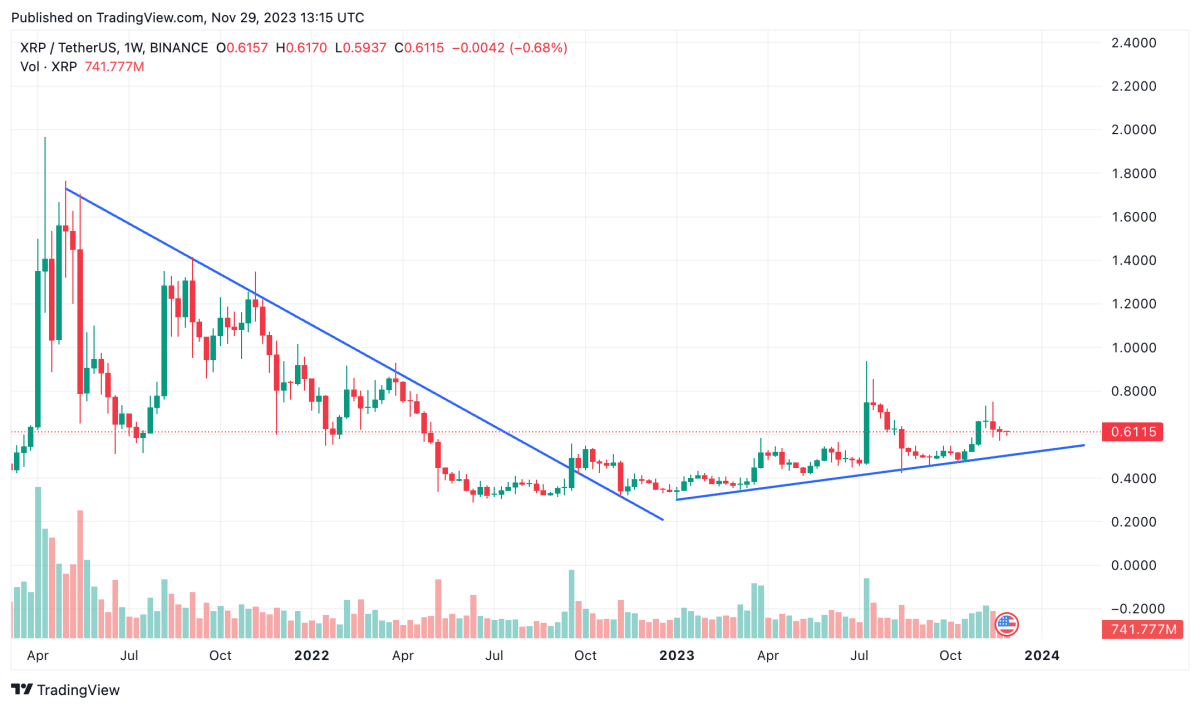XRP And The SEC: Latest News And The Commodity Classification Question

Table of Contents
The SEC's Case Against Ripple
The Allegation of Unregistered Securities Sales
The SEC alleges that Ripple's sale of XRP constituted an unregistered securities offering, violating Section 5 of the Securities Act of 1933. This means Ripple allegedly offered and sold XRP without properly registering it with the SEC, a violation carrying significant financial penalties. The SEC's core argument hinges on the application of the Howey Test.
- The Howey Test: This test determines whether an investment contract qualifies as a security. It considers four key elements: an investment of money, in a common enterprise, with a reasonable expectation of profits, derived primarily from the efforts of others. The SEC argues that XRP satisfies all four prongs, citing Ripple's involvement in marketing and development of the XRP ecosystem as a crucial factor.
- Investor Expectations: The SEC emphasizes that many XRP purchasers expected profits based on Ripple's efforts to increase XRP's value and adoption. They point to Ripple's marketing materials and the overall structure of XRP distribution as contributing to these expectations.
- Key Figures: The case involves key figures like Brad Garlinghouse (CEO of Ripple) and Chris Larsen (Executive Chairman of Ripple), who are also named defendants in the lawsuit.
Ripple's Defense Strategy
Ripple vehemently denies the SEC's allegations, arguing that XRP is a decentralized digital asset functioning as a currency or a commodity, not a security.
- Decentralized Nature: Ripple highlights XRP's decentralized exchange and the lack of centralized control over its distribution and trading. They argue that this contrasts sharply with the characteristics of a typical security. They emphasize the numerous independent exchanges where XRP is traded.
- Lack of Centralized Offering: Ripple contends that the majority of XRP sales weren't directly conducted by Ripple, but rather through various independent exchanges, thereby undermining the SEC's claim of an unregistered securities offering.
- Currency/Commodity Argument: Ripple's core defense revolves around establishing XRP as a functional currency or commodity, comparable to gold or other established commodities. They point to its use in cross-border payments and various transactional applications.
Recent Developments and Court Proceedings
Key Legal Rulings and Their Implications
The Ripple-SEC case has seen significant legal maneuvering. The court's rulings have been highly anticipated and have had considerable market impact.
- Recent Motions and Filings: Both sides have submitted numerous motions, including motions to dismiss, motions for summary judgment, and various evidentiary filings. The sheer volume of filings reflects the complexities of the legal arguments.
- Expert Testimony: Both the SEC and Ripple have presented expert witnesses to support their respective claims. These experts have offered contrasting opinions on the technical aspects of XRP and its classification.
- Partial Victories: While no definitive ruling has been reached, certain aspects of the case have seen incremental rulings favoring one side or the other, affecting the overall trajectory of the litigation.
The Impact on the Crypto Market
The Ripple-SEC case has created significant regulatory uncertainty within the cryptocurrency market.
- XRP Price Fluctuations: XRP's price has been highly volatile, directly correlating with the developments in the court case. Significant legal wins or setbacks for either side have been immediately reflected in XRP's market value.
- Wider Implications for Cryptocurrencies: The outcome of this case will set a precedent, potentially influencing the regulatory landscape for other cryptocurrencies facing similar scrutiny. It carries significant implications for the overall growth and future direction of the crypto industry.
- Investor Sentiment: Investor confidence in the broader crypto market has been impacted by the case's uncertainty. Positive developments generally improve sentiment, whereas negative developments can lead to market sell-offs.
The Commodity Classification Debate
Arguments for XRP as a Commodity
Arguments supporting XRP's classification as a commodity emphasize its inherent characteristics and utility.
- Decentralized Medium of Exchange: XRP functions as a decentralized medium of exchange, facilitating transactions across various platforms. This functionality is central to the commodity argument.
- Comparison to Established Commodities: Proponents highlight similarities between XRP and established commodities like gold, focusing on its transactional utility and lack of inherent ownership rights tied to a centralized entity.
Arguments Against XRP as a Commodity
Counterarguments against XRP's commodity classification emphasize aspects potentially aligning with security characteristics.
- Potential for Profit Based on Ripple's Activities: Critics point to the fact that Ripple's actions and development efforts could influence XRP's value, implying a connection to profit generation that could be seen as inherent to a security.
- Ripple's Involvement in the XRP Ecosystem: The degree of Ripple's involvement in the XRP ecosystem is a key point of contention. The extent to which Ripple's actions drive XRP's value affects its classification.
Conclusion
The Ripple-SEC case represents a landmark legal battle shaping the future of cryptocurrency regulation. The debate over XRP's classification as a security or a commodity remains central. The arguments presented by both sides highlight the complexities of applying existing securities laws to novel digital assets. While the final outcome remains uncertain, the case's impact on the broader crypto market is undeniable.
The Ripple-SEC lawsuit highlights the complexities of regulating cryptocurrencies. Staying informed about the latest news and legal developments regarding XRP and its commodity classification is crucial for navigating the evolving cryptocurrency landscape. Continue to follow updates on this landmark case to better understand the future of XRP and the broader regulatory environment for digital assets. Learn more about the XRP and SEC case and its implications for the future of crypto.

Featured Posts
-
 Lee Andersons Civil War Claims Tory Party Dysfunction Explodes
May 02, 2025
Lee Andersons Civil War Claims Tory Party Dysfunction Explodes
May 02, 2025 -
 Aston Villa Transfer Target Souness Weighs In On Rashford
May 02, 2025
Aston Villa Transfer Target Souness Weighs In On Rashford
May 02, 2025 -
 Fortnite Item Shop New Feature Improves Player Experience
May 02, 2025
Fortnite Item Shop New Feature Improves Player Experience
May 02, 2025 -
 Xrp Price Prediction Will Xrp Reach 5 After Sec Lawsuit Dismissal
May 02, 2025
Xrp Price Prediction Will Xrp Reach 5 After Sec Lawsuit Dismissal
May 02, 2025 -
 Trust Care Health Announces Expansion Into Mental Health Services
May 02, 2025
Trust Care Health Announces Expansion Into Mental Health Services
May 02, 2025
Latest Posts
-
 Unian Novye Detali O Dogovore Mezhdu Frantsiey I Polshey Makron I Tusk
May 10, 2025
Unian Novye Detali O Dogovore Mezhdu Frantsiey I Polshey Makron I Tusk
May 10, 2025 -
 Franko Polskoe Partnerstvo Podpisanie Oboronnogo Soglasheniya I Ego Mezhdunarodnoe Znachenie
May 10, 2025
Franko Polskoe Partnerstvo Podpisanie Oboronnogo Soglasheniya I Ego Mezhdunarodnoe Znachenie
May 10, 2025 -
 Frantsiya I Polsha Podrobnosti Oboronnogo Soglasheniya Ot 9 Maya
May 10, 2025
Frantsiya I Polsha Podrobnosti Oboronnogo Soglasheniya Ot 9 Maya
May 10, 2025 -
 Dogovor Frantsii I Polshi Makron I Tusk Dostigli Soglasheniya Unian
May 10, 2025
Dogovor Frantsii I Polshi Makron I Tusk Dostigli Soglasheniya Unian
May 10, 2025 -
 Oboronniy Soyuz Frantsii I Polshi Posledstviya Dlya Transatlanticheskikh I Rossiysko Evropeyskikh Otnosheniy
May 10, 2025
Oboronniy Soyuz Frantsii I Polshi Posledstviya Dlya Transatlanticheskikh I Rossiysko Evropeyskikh Otnosheniy
May 10, 2025
